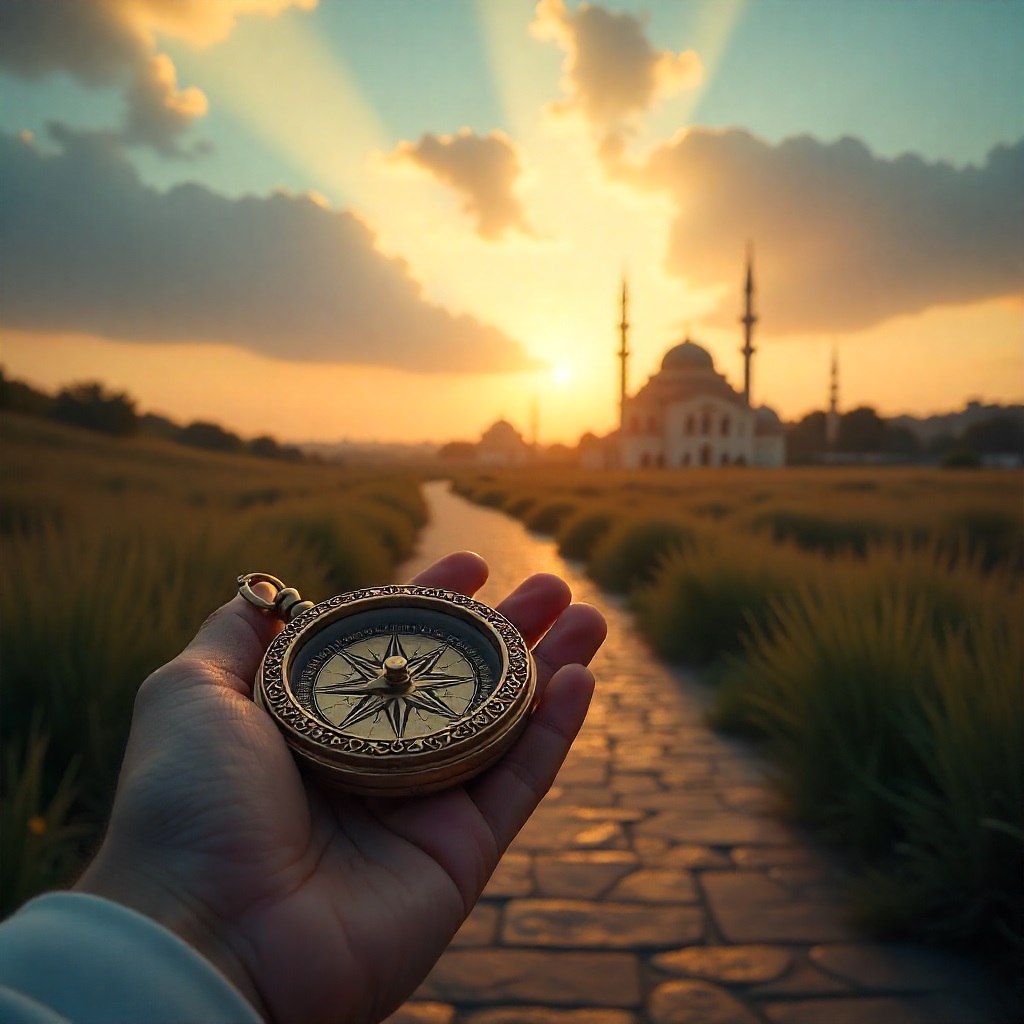Bismillah-ir-Rahman-ir-Rahim (In the name of Allah, the Most Gracious, the Most Merciful)
As-salamu ‘alaykum, dear friend, and welcome. Welcome to the very first step on the path we promised to walk together.
Have you ever found yourself in a quiet moment—perhaps lying awake long after the world has gone to sleep, or driving home from work as the sky fades to dusk—and felt a silent question rise from the depths of your being?
Externally, everything might seem fine. You may have checked all the boxes: the education, the career, the family, the stable life. Yet, a persistent, hollow echo remains. A gentle but unshakeable whisper that asks, “Is this really it? Is this all I was made for?”
If this feeling resonates with you, know that you are standing at a sacred threshold. As we explained in the main introduction to ‘The Divine Purpose’ series, this deep yearning for something more is not a sign of weakness or failure. It is the opposite. It is the sign of a living, healthy soul calling out for its true purpose. It is the start of the most important journey you will ever take: the journey of finding meaning in Islam, a path that promises to transform that restless echo into a peaceful and profound conversation with your Creator.
The Hollow Echo in a Full Life
We live in a world of paradox. We have more access to information, entertainment, and material comfort than any generation in human history, yet we also face epidemic levels of anxiety, loneliness, and a pervasive sense of emptiness.
Our culture presents us with a clear, if unstated, formula for happiness: achieve, acquire, and experience. We are encouraged to build a life that looks good on the outside. So we pursue the degree, we climb the career ladder, we curate the perfect social media feed, and we fill our homes with things that promise to bring us joy.
And for a time, it can work. The thrill of a promotion, the excitement of a new purchase, the temporary validation of online praise—these things can fill the silence. But the silence always returns, doesn’t it? It creeps back in the quiet moments, a hollow feeling right in the center of a life that is, by all accounts, full.
This is the “Meaningful Void.”
It is not a void of possessions, but a void of purpose. It is not a lack of activity, but a lack of significance. It is the soul’s cry of protest against a life that nourishes the body and the ego but starves the spirit. It’s the feeling of having a magnificent, state-of-the-art instrument in your hands, one designed to play a divine symphony, but only using it to create meaningless noise.
This void is not a problem to be solved with more distraction or consumption. It is a messenger carrying a sacred invitation. It is asking you to pause, to look deeper, and to finally ask the questions that truly matter: Who am I, really? Why am I here? And where am I going? The answers to these questions are the foundation for finding meaning in Islam.
The Divine Imprint: Understanding Your Fitra
So, where does this profound, unshakeable search for meaning originate? Why are we, as human beings, uniquely programmed to seek a purpose that transcends mere survival and pleasure?
Islam provides a breathtakingly beautiful answer in a single, powerful word: Fitra.
Fitra is the soul’s primordial nature, its spiritual DNA, its factory setting. It is the pure, pristine state upon which Allah (SWT) created every single human soul. Before you had a name, a body, or a place in this world, your soul existed in a state of pure, unadulterated awareness of its Creator. This is not poetry; it is a reality described in the Qur’an itself.
Allah reminds us of this primordial covenant He took with every soul:
“And [mention] when your Lord took from the children of Adam—from their loins—their descendants and made them testify of themselves, [saying to them], “Am I not your Lord?” They said, “Yes, we have testified.” [This]—lest you should say on the day of Resurrection, “Indeed, we were of this unaware.” (Surah Al-A’raf, 7:172)
Let the weight of this verse settle in your heart. Before your worldly journey began, your soul had already met its Lord. It already bore witness to His reality. That memory, though now veiled by the distractions and experiences of this life (dunya), is not erased. It is imprinted upon the very core of your being.
Therefore, the search for meaning is not a quest for something foreign or new. It is a journey of remembrance. It is the process of uncovering a truth you already know deep within. This innate knowledge is the reason why finding meaning in Islam often doesn’t feel like a conversion, but a homecoming.
The Soul’s Compass: A Powerful Analogy
To understand Fitra in a practical way, think of your soul as being equipped with a perfect, internal compass. The needle of this compass is exquisitely designed to do one thing with flawless precision: point North.
For the human soul, “North” is Allah. It is the direction of truth, purpose, and peace—the very essence of what people are looking for when finding meaning in Islam.
When we enter this world, our compass is pointing true. This is the essence of the famous Hadith where the Prophet Muhammad (peace and blessings be upon him) said:
“No child is born except upon the Fitra. It is his parents who make him a Jew, a Christian, or a Magian…” (Sahih al-Bukhari)

Our innate disposition is pure. But as we navigate life, our environment creates powerful magnetic fields that interfere with our compass. These interferences pull the needle of our soul in a thousand different directions:
- The Magnet of Materialism: The constant message that your value is in what you own.
- The Magnet of Social Approval: The desperate need for validation, likes, and praise from others.
- The Magnet of the Ego (Nafs): The internal pull towards arrogance, selfishness, and base desires.
- The Magnet of Worldly Distractions: The endless stream of entertainment and noise designed to keep you from introspection.
Under the influence of these powerful, competing forces, the needle of our compass begins to spin wildly. We feel disoriented, anxious, and pulled apart. That feeling of restlessness and inner turmoil you experience is the vibration of that compass needle, desperately trying to fight the interference and re-orient itself toward its true North. Understanding this internal struggle is a key step in finding meaning in Islam.
The Empty Promises of a Material World
The modern, secular world, largely unaware of the Fitra, looks at this restless spiritual state and misdiagnoses it. It sees the Meaningful Void not as a sacred signal, but as a psychological glitch to be patched with external fixes.
It offers a litany of empty promises:
- The Promise of Consumption: “Feeling empty? Buy this. The fleeting dopamine rush of a new product will fill that hole in your life.” But this puts you on a “hedonic treadmill,” where each new purchase provides a smaller and shorter-lived thrill, leaving the void even wider than before.
- The Promise of Status: “Feeling lost? Chase that promotion, that title, that blue checkmark. The envy and admiration of others will give you a sense of self.” But basing your worth on the ever-shifting opinions of others is a recipe for perpetual anxiety.
- The Promise of Numbing: “Feeling uncomfortable? Binge this show, scroll this feed, lose yourself in this game.” These distractions are powerful anesthetics. They can temporarily numb the ache of meaninglessness, but they never cure the underlying condition. The moment the distraction ends, the silence and the void return.
These are the strategies of a world that tries to solve an internal, spiritual problem with an external, material solution. It’s like trying to quench a soul-deep thirst by drinking saltwater. It not only fails to satisfy, but it ultimately worsens the condition, leaving you more dehydrated and desperate than when you began. True satisfaction only comes from a spiritual source, and this realization is central to finding meaning in Islam.
Islam liberates us from this exhausting, soul-crushing cycle by providing a true framework for finding meaning in Islam. It validates our ache and tells us, “Yes, that void is real. But you have been looking for the cure in the wrong pharmacy.”
Heeding the Call: Your Search is a Sacred Sign
Let us now, together, reframe this entire experience. That feeling of emptiness, that restless search, that “Meaningful void”—it is not a sign that you are broken. It is definitive proof that your soul is alive, healthy, and functioning exactly as it was designed.
A spiritually dead soul feels nothing. It is content with the distractions, numb to its own purpose, and comfortable in its disorientation. The fact that you feel this spiritual ache, this divine homesickness, is a profound and beautiful mercy from Allah. It is His way of calling you back to Him, of gently guiding you home.
The Thirst in the Desert
Imagine a person lost in a vast desert under a blazing sun. What is the most life-affirming feeling they can have? Thirst. Thirst is painful, uncomfortable, and relentless. But it is also the very biological mechanism that will motivate them to search for an oasis and save their own life. The most dangerous thing that could happen to this person is for them to stop feeling thirsty.
Your spiritual thirst—your search for meaning—is that life-saving mechanism. It is your Fitra at work, protecting you from spiritual peril, pushing you to seek the living waters of faith, remembrance, and purpose. This purposeful search is the essence of finding meaning in Islam.
This journey you are on is not merely a personal self-help project; it is an active response to a Divine call. This is what makes the path of finding meaning in Islam so profound and supported by the Divine.
. It is you taking the first, crucial step. And Allah’s promise to the one who begins this journey of finding meaning in Islam is among the most hope-filled and inspiring messages in our entire faith. In a sacred Hadith (Hadith Qudsi), Allah Himself says:
“…And if he draws near to Me a hand’s span, I draw near to him a cubit; and if he draws near to Me a cubit, I draw near to him a fathom. And if he comes to Me walking, I go to him at speed.” (Narrated by Bukhari & Muslim)
Your search, your questions, your prayers, your reading of these very words—this is your “walking.” This is your act of drawing near. And the response from the Lord of the Worlds is not passive or hesitant. It is swift, immense, and guaranteed. You are not walking this path alone.
The Journey Ahead
As we conclude our first lesson, we invite you to let go of any guilt or anxiety you may have felt about your search. Embrace it. Honor it. It is the echo of your soul remembering its true origin. It is the most authentic part of you crying out for the nourishment it was created to receive.
We have now established why we search. We have uncovered the Divine imprint of the Fitra and learned to see our restlessness as a sacred call. We hope this has provided a solid foundation for your journey toward finding meaning in Islam.
The essential question that follows is: What is the answer?
If our soul’s compass is meant to point North, what does that North look like in our daily lives? What is the Great Purpose that fills the Meaningful Void, calms the spinning compass, and brings a deep, unshakable peace to the heart?
In our next lesson, we will step directly into the light of that revelation. We will explore “The Great Answer” that Islam provides—the beautiful and comprehensive concept of Ibadah (worship)—and discover how it redefines everything, turning every corner of our lives into a source of profound meaning.
Until then, carry this truth with you: your search is a blessing. You are already on your way home, taking the first courageous steps toward finding meaning in Islam.
For Reflection & Community Discussion
Your experiences and reflections are a valuable part of our community’s journey. Please take a moment to ponder these questions and share your thoughts in the comments below.
- When have you most intensely felt that “Meaningful Void” or restlessness in your life? What were the circumstances surrounding that feeling?
- The compass analogy suggests our soul naturally points toward Allah, but “magnetic interference” pulls it away. What are some of the biggest sources of ‘interference’ (e.g., pressures, distractions, habits) you notice in your own life?
- How has this lesson shifted your perspective on the process of finding meaning in Islam? Did you previously see your spiritual restlessness as a positive or a negative sign?
Continue Your Journey with Our Resources
We believe that learning is a continuous journey. If the concepts in this lesson resonated with you and you are eager to dive deeper into the practical aspects of Islamic personal development, we invite you to explore our collection of books and guides. Each resource is designed to provide you with the tools and wisdom to build a life of purpose and intention.





